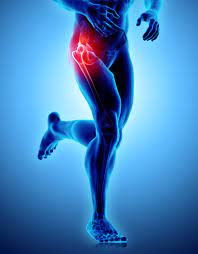7 Causes of Hip Pain and Their Remedies
February 21 2023 – Nysh Website

Hip pain is all too common these days and anybody can experience it from university students to professional athletes to elderly individuals. But every hip pain is different and happens due to different causes. At times it can be because of something minor like sitting in the wrong posture for too long. There are other causes of hip pain and remedies which you can learn about by reading on.
Where Is Your Hip Pain?
Not every hip pain is the same. Depending on where your hip is hurting and the intensity of the pain, the way you treat it will also differ. One can have hip pains in the outer hip area including the upper thighs and buttocks. This is usually due to bad sitting posture. And hip pain on the inner side of your thighs and pelvic area generally occurs due to problems with the hip bones and joints.
While hip pains are quite subjective in nature, here are some of the most common causes of hip pains.
7 Common Causes Of Hip Pain
- Osteoarthritis
- Bursitis
- Tendonitis
- Muscle Injuries
- Hip Labral Tears
- Hip Fractures
- Herniated Disc
1. Osteoarthritis
Osteoarthritis is one of the most common causes of hip pains, especially in people over the age of 65 years. It causes dull stiffness of your joints due to the wearing down of cartilage. Normally, your cartilage helps the bones glide smoothly over one another in joints such as the hip. Since the cartilage breaks down, the thigh bone rubs directly against the inner hip socket.
Some of the common areas of pain are the groin and front of the thigh, especially during walking or getting out of the car.
2. Bursitis
The pockets of liquid found between tissues like bones, tendons, and muscles, that protect the joints after injury, are called bursae. They also ease the friction when joints rub together. Bursitis is simply the inflammation of these fluid-filled sacs. This is common as we age, and is especially prevalent in individuals above the age of 60 years of age.
This inflammation can be due to repetitive activities that overwork the hip joints. Bursitis can cause pain on the outer surface of the hip joints. It causes pain when walking, standing up, or climbing stairs.
3. Tendonitis
Tendons are thick bands of tissue that do the job of connecting muscles to the bones, in this case, the hip bone. Tendonitis is the inflammation or irritation of these tendons. It can become extremely painful through repetitive and strenuous activities.
Individuals who indulge in specific activities over and over again, like soccer, for instance, can be at risk for tendonitis. Over-using the tendons creates repeated minor injuries that can eventually lead to imbalances in the hip muscles.
4. Muscle Injuries
Muscle injuries are quite a common cause of hip pains, especially for athletes and fitness enthusiasts. They can be caused by strains or tears in the muscle or other soft tissues. These tears can be from muscle overuse from repetitive activities that put a strain on the ligaments and tendons supporting the hip.
When these ligaments and tendons become inflamed due to overworking, they can cause pain and prevent the hip from moving with ease. Most of the time, it is the back and the hip muscles that get strained since the abdominal muscles are too weak to provide support.
5. Hip Labral Tears
The ring of cartilage that surrounds the hip socket is called the labrum. It ensures that the ball of the thigh bone stays in place. The labrum cushions your hip joint and acts as a rubber seal that holds the thigh bone securely within the hip socket. When this labrum tears it can cause immense pain in the hip and groin area, and restricts movements.
People who make use of repetitive twisting movements, like ballerinas and gymnasts, are at a higher risk of developing this problem.
6. Hip Fractures
As we age, our bones become weak and brittle and are susceptible to breaking during a fall. That’s why older individuals are prone to hurting their hip bones or even fracturing it during normal activities.
Other than older people, younger individuals might develop stress fractures on their hips due to over-activity. This is because the muscles become fatigued and fail to absorb the shock of impact from jumping and other activities, and can cause tiny cracks in the bone. These stress fractures can cause severe sharp pain in the hip.
7. Herniated Disc
Discs are rubbery cushions that sit between the bones in the spinal column and absorb the shock from falls or injuries. These discs are separate and cushion the vertebrae. As we age these discs grow brittle and can rupture, which is called a herniated disc. While a herniated disc can occur on any part of the spine, it is most common in the lower back. It can radiate pain from the spine to the nerve endings at the tailbone to the legs.
Some Remedies For Hip Pain
Depending on where you’re feeling pain and its intensity the remedies for hip pain differ from one person to another. If you’re facing some minor hip pain, that is somewhere between a low to moderate level of pain you can try these home remedies.
- Rest: When you’ve hurt your hip, rest your body and avoid overusing your lower body.
- Ice and Heat: The next step is icing the inflamed area with ice packs, which may relieve pain, and reduce swelling and muscle spasms. You can also apply heat, especially during winters when you can’t bear to apply ice for a sore hip.
Deep heat relaxation from pain relief patches help provide soothing warmth. Alternate between hot and cold packs depending on what helps you feel better.
- Pain Medications: In case of muscle pulls and strains, you can also opt for pain relievers and anti-inflammatory medications. These can be purchased over the counter or with a prescription.
- Visit The Doctor: If even after all this, your pain is constant and causing discomfort, then you should consider visiting a doctor and seeking medical attention. In case of major injuries like hip fractures, osteoarthritis, or herniated discs consider seeking medical attention immediately.
Summing Up
Hip pains are common as you grow old and your bones begin becoming weak and brittle. It can also be caused by bad posture or a sedentary lifestyle. So be sure to have some form of physical activity in your day-to-day schedule, even if it is a 20-minute walk. Hip pains can be prevented and treated both by home remedies or in critical cases with appropriate medical help.
FAQs
What Is The Most Common Reason For Hip Pain?
Arthritis, specifically osteoarthritis and rheumatoid arthritis, are the most common reasons for hip pain, especially in older adults. Other common causes of hip pain include muscle injuries, tendonitis, and bursitis.
How Do I Know If My Hip Pain Is Serious?
Your hip pain is serious if your joint appears deformed, if you’re feeling intense pain or if there is a sudden swelling, or if you’re unable to move your legs or hip. If you see any of these signs, you should immediately visit the hospital.
Is Walking Good For Hip Pains?
Walking is a great way to relieve hip pains. It helps keep your hip and leg joints mobile and reduces stiffness. But if even after regular walking you’re experiencing hip pain, then you should visit your doctor, as there could be a possibility of a hip injury.
How Can I Relieve Hip Pain At Home?
Regular exercise, over-the-counter pain relief medications, applying ice packs or using pain relief patches are some home remedies for relieving hip pain.


0 comments